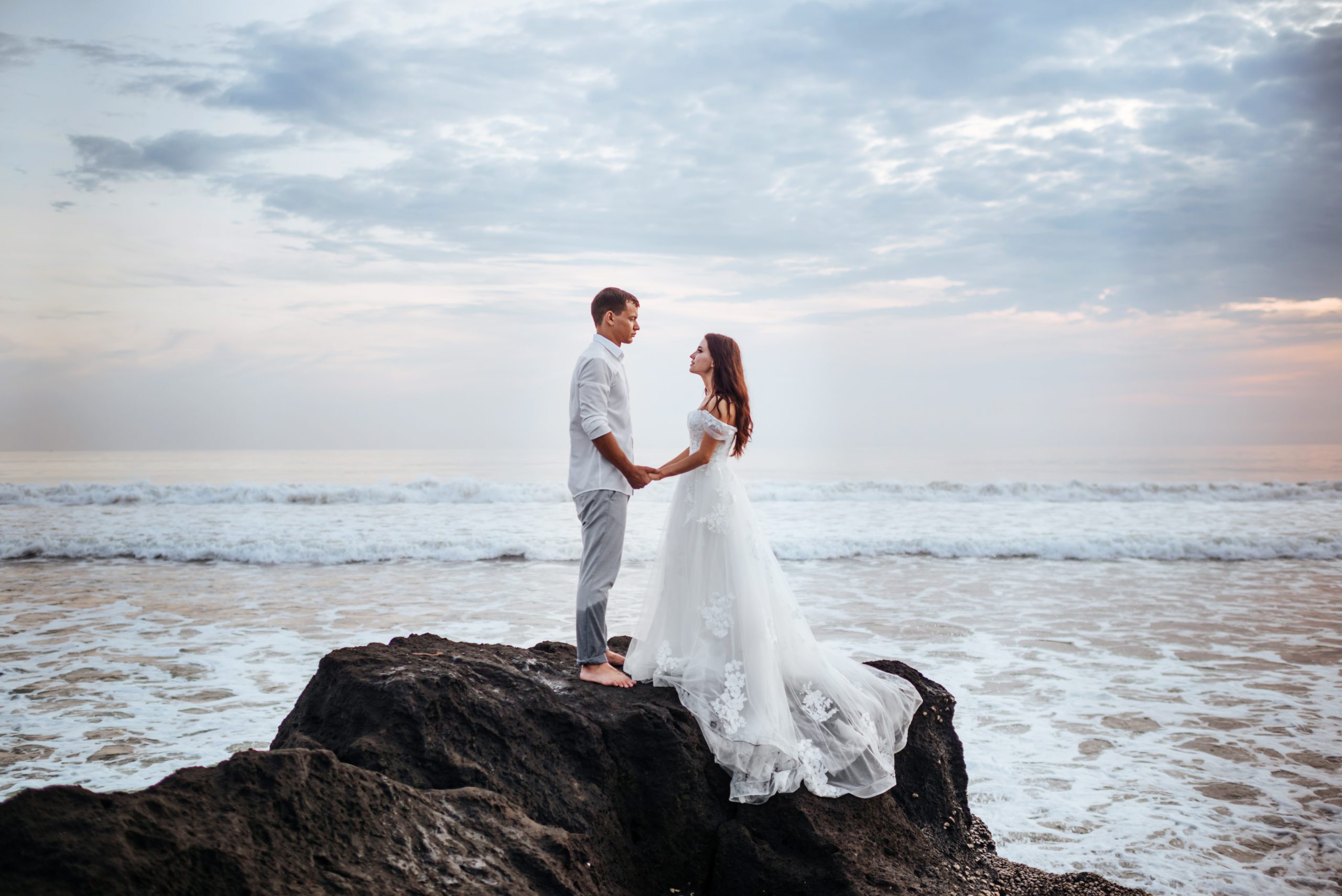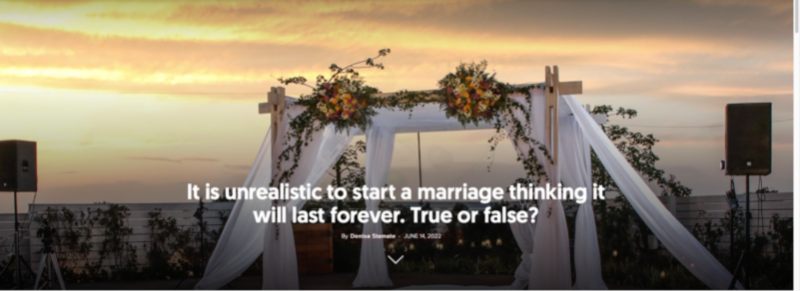Nine years ago, as my then-fiancé and I were deep in the throes of folding paper flowers, painting glass bottles, and designing and making our own wedding stationery, the question popped up fairly regularly: Why don’t we just elope?
In a bid to save costs we had to organise and make a lot of things ourselves, my wedding dress included. Between the expense, logistics and time required, stress and exhaustion took its toll on us, causing us to snap at each other often. Our relationship was probably at its most tense while we were planning our wedding. The irony wasn’t lost on us, hence the consideration of eloping.
Thankfully, our relationship survived, we had a wonderful wedding day (in spite of hail and rain appearing uninvited at our outdoor ceremony) and we were pleased to have spent just a fraction of the national average (estimated at around $50,000 by wedding websites).
The beautiful memories from the wedding itself erased the bad ones from planning the wedding. We were glad we’d persevered with a traditional wedding ceremony instead of choosing to have our marriage simply officiated by a celebrant and witnessed by two others.
It’s difficult to determine exactly the number of couples who have gotten married the “traditional” way versus those who have chosen other means: official statistics count the number of marriages registered, not how they were conducted. Weddings these days range from the conventional church and reception ceremony to the retain-some-traditional-elements microweddings, and going-completely-against-the-grain elopements, all of which are legally registered and recognised.
However, if you presume ministers of religion don’t tend to preside over weddings held outside of churches, then some 78 per cent of all marriages in Australia in 2017 (totalling 112,954) were conducted non-traditionally.
In 2004, Josh and Britt Withers started the Pop-Up Wedding Co. and in 2013 reinvented themselves to become The Elopement Collective.
“Since we made the product available, more people have found it advantageous and a friendlier alternative,” says Josh. “I don’t know if we pioneered the trend or it already existed, but since we started promoting it, hundreds of people a year enquire because the idea of getting married without having to invite all your cousins and all your family, and even just the drama . . . some people just want to be married without the hassle.”
While the term elopement used to conjure up images of a couple hastily getting married, either to avoid some form of scandal or parental objection, eloping in the twenty-first century is more about its simplicity.
Melanie and Mark Richardson, a couple from the Sunshine Coast in Queensland, eloped in September last year. “We decided to elope after we had a large engagement party where we hardly even saw each other all night,” says Melanie. “We decided we would rather spend [our] special occasion together. We did start to plan a ‘normal’ wedding; however, we found ourselves making choices to please others, not ourselves.”
While many may think the decision to elope is based purely on finances—and there certainly are budgetary advantages—the reasons couples give for eloping are usually about wanting to avoid the hassle and diplomacy required to plan a traditional wedding.
“A lot of people think it’s about money, but it’s most definitely not about money,” Josh says of the couples who have approached The Elopement Collective. “They just want to avoid hosting an event. A wedding is a public event [but it’s also like a] birthday. Some people don’t want 100 to 200 people in the room for their birthday and are very happy with an intimate and personal celebration.”
Unlike “traditional” elopements—if there is such a term—modern-day elopements tend to comprise more guests than simply a celebrant and the required number of witnesses to make the marriage official. Josh estimates an average of six to eight guests at an elopement, often involving two sets of parents, siblings, close friends and any children from the couple’s previous relationships.
Ten close family members attended Melanie and Mark’s elopement and despite the unconventional beach setting, they still chose to retain some traditional elements: they exchanged wedding rings and Melanie’s father walked her down the “aisle” alongside Mark.
Weddings have often been considered a Christian construct—in Western societies they have traditionally been conducted within the sacred walls of a church and, up until recently, even non-Christian couples would choose to get married there. What then does the recent trend of eloping mean for Christianity and a couple’s marriage? Does eloping—or getting married anywhere outside of a church—impact on its sanctity?
Dr Loyd Uglow is a history and writing professor at Southwestern Assemblies of God University in Texas, USA. In an article titled “The History of Marriage” on the university’s website, he writes, “Although it’s clear that God instituted marriage in the beginning, there have been differing views about whether weddings are primarily religious or secular events. For much of the early Christian era, the Church stayed out of weddings and let the state handle the union of man and woman. Finally, sometime after AD 800, the Church began to perform weddings, and a few centuries later the Catholic Church made marriage one of the sacraments.”
What Uglow is suggesting is that, while marriage was created and sanctified by God, a wedding is simply a ritual adopted by the Christian church, not necessarily a God-ordained event.
Dr Trafford Fischer, a pastor and family-life educator with 10 years of experience as the director of family ministries for the Seventh-day Adventist Church in the South Pacific region, agrees with Uglow.
“While the Bible speaks of love, and certainly addresses sexuality in and out of marriage, it is noticeably quiet on any of the details of a wedding service or ceremony; nor does it provide any specifics God might require as to the order of service, venue or who should attend,” says Fischer.
“The Bible seems silent on the topic of elopement. If we accept that elopement is a desire to marry, with minimum involvement of family and friends, then it may be safe to suggest that elopement isn’t ‘anti-biblical’. The couple chooses to marry, which is what the church teaches as a biblical mandate, and they ensure their marriage is legally acceptable and recorded by the government.”
At the end of the day, the key indicator of a successful marriage isn’t so much about how the wedding has been conducted, but more about the decision a couple has made to declare an official commitment to each other.
“There’s a difference between having a wedding and getting married,” says Josh. “It’s like, if you want to travel to Brisbane from Sydney, the most common way is to fly, but there are other ways—you can drive, take the train or even swim. For a couple, they just want to be married; they value marriage.”
Fischer is quick to point out that there is a difference between elopements and de facto relationships, in that generally, there is an element of a vow, which “can act as significantly binding for a couple—if they state and keep [the vows] seriously, vowing before their witnesses that they will keep their relationship through thick and thin . . . till they die! This can be a serious ‘gluing’ factor for couples that cohabitating doesn’t provide.”
For Christians, that level of commitment involves a third party: God. A Christian wedding ceremony—or elopement—will acknowledge the presence of God and His guidance on the relationship, and involve a request for His blessing on the couple’s future.
Critics of marriage may claim statistics show a decline in the number of weddings and the frequent rates of divorce as proof of marriage’s lack of effectiveness, but when you analyse the marriage and divorce figures together, they actually tell a different story.
Based on the latest Australian Census in 2016, “there were more than 5.5 times as many married people as divorced people. . . . The pool of married people is increasing every year, since the divorce rate is much lower than the marriage rate and falling,” writes Caitlin Fitzsimmons in a Sydney Morning Herald article, “Marriage in Australia is changing but still going strong.”
A successful marriage, it seems, isn’t so much dependent on the wedding venue, the budget or the number of guests in attendance; it’s more about the desire for a deeper level of commitment.
Joachim and Sam
“We still had a full wedding, just on a miniature scale. We were looking at more than 80 people and $45,000 if we had a full-scale wedding, but our entire wedding—including accommodation for our guests, rings, venues and photography—was around $7,000. Additionally, we knew our autistic son couldn’t handle a big wedding. So it was easier and ultimately perfect for us. We had a great day and the kids were able to enjoy the day as well.”
Theodora and Chaan
“After dating for seven years I was over the moon when he proposed! The first task to complete was the guest list. Being islanders we knew it would be a big wedding but we never imagined 536! After 18 months of arguing about who to cut from the list, I gave Chaan the ultimatum: it’s everyone or no-one. We couldn’t afford everyone, so it was no-one.
“We booked an Airbnb on a secluded beachfront, hired my dress, bought his suit, grabbed a few friends to witness the ceremony, a pastor friend to make it legal, and a photographer and videographer to capture the day. It was the best decision—to us, it was perfect! The video and photos were shown to family. We had a bit of a backlash, but everyone understood why we did it.”
Melody Tan is project manager of Mums at the Table. She lives in Sydney with her husband and son. A version of this article first appeared on the Signs of the Times Australia/New Zealand website and is republished with permission.




















